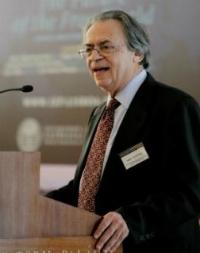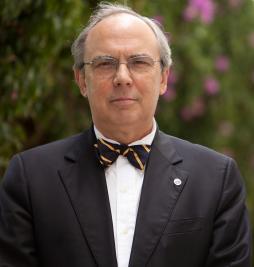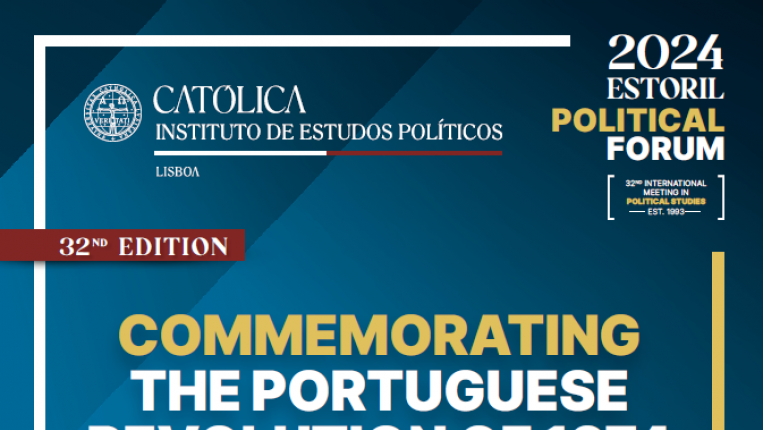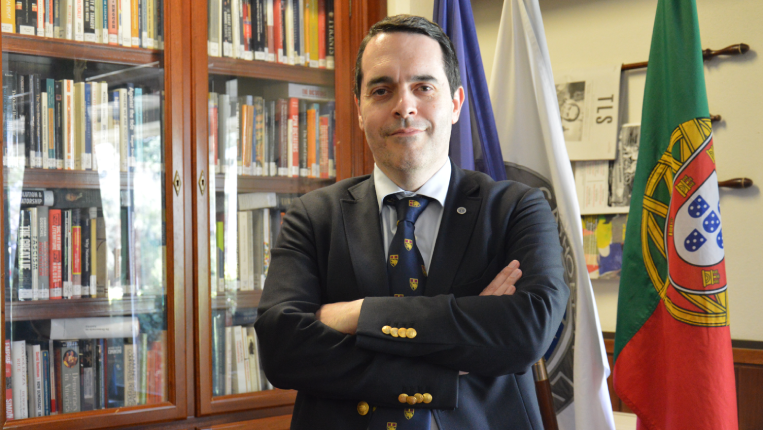Message from the Chair of the IAB

"This program will not only be a home for teaching and research on democracy, but also provide a forum for the exchange of ideas and experiences among scholars and practitioners of democracy from around the world. This strikes me as a very attractive project, and I am honored to have been asked to chair an International Advisory Board that will provide it with oversight and guidance.
It is clear that the Advisory Board will be an advisory rather than a governing body, and that our recommendations will be conveyed to the scientific (i.e., academic) committee that directs the Institute. I believe that the Board can make an important contribution, both in bringing an international perspective and international standards to bear on the new MA program and in helping to maintain links between the program and related institutions outside of Portugal.”
Marc Plattner
Co-editor, Journal of Democracy
Vice-President for Research and Studies, National Endowment for Democracy, Washington DC
Message from the Co-Chair of the IAB

"This MA program not only aims at combining a strong teaching dimension with high-quality research. It also intends to provide permanent forum for scholars and practitioners working in the field of democracy. This third dimension is perhaps the most innovative and the one that can best help define the whole project. We will provide students with basic knowledge of the field through a standard course-based two-semester program.
We will add to that a very flexible program of seminars, lectures, workshops and debates involving scholars and practitioners from all over the world. We hope that from this interaction there will emerge new research projects that will attract some of our best students - who will come from overseas as well as from Portugal and the Portuguese-speaking countries.
To ensure that the program is international in scope and of the highest quality, we rely on an International Advisory Board composed of distinguished scholars and leading figures in the promotion of democracy. We trust that the IAB will guarantee an ongoing conversation with the existing institutions committed to democracy. We also expect the Board to provide guidance and oversight for the new MA.”
Professor João Carlos Espada
Professor and Founder of Institute for Political Studies (IEP)
The International Advisory Board of the Institute for Political Studies is constituted by the following members:
- Araújo, Maria João, University of Oxford; President of the Coordination Committee, Portugal-UK 650;
- Plattner, Marc (Chairman), Coeditor Emeritus, Journal of Democracy, Washington, D.C.;
- Becchio, Giandomenica Università degli Studi di Torino;
- Diamond, Larry, Senior fellow at the Hoover Institution and the Mosbacher Senior Fellow in Global Democracy at the Freeman Spogli Institute for International Studies (FSI) at Stanford. University;
- Espada, João Carlos IEP UCP, Lisbon;
- Flather, Paul Fellow of Mansfield College, Oxford; Former Deputy-Editor, New Statesman;
- Galston, William, Brookings Institution, Washington, D.C;
- Garton Ash, Timothy, Professor of European Studies and Isaiah Berlin Professorial Fellow, St. Antony’s College, Oxford; Senior Fellow, The Hoover Institution, Stanford University;
- Gershman, Carl Founding President, The National Endowment for Democracy, Washington D.C.;
- Györffy, Dóra Corvinius University, Budapest;
- Hála, Martin Charles University, Prague;
- Hofmeister, Wilhelm, Former Director for Spain and Portugal, Konrad Adenauer Stiftung, Madrid;
- Krastev, Ivan Chair of the Board of Centre for Liberal Strategies, Sofia; Permanent Fellow at the Institute for Human Sciences (IWM) , Vienna; Member of the Editorial Board, Journal of Democracy;
- Mach, Zdzislaw Professor of Sociology and European Studies, Dean of the Faculty of International and Political Studies, Jagiellonian University in Krakow;
- Magen, Amichai Senior Lecturer and Head of the MA Program in Diplomacy & Conflict Studies, Lauder School of Government, Diplomacy and Strategy, The Interdisciplinary Center (IDC), Herzliya., Israel;
- Mayer, Hartmut Chairman, Europaeum, Oxford;
- Marshall, Catherine CY Cergy Paris Université;
- Muller, James W. Professor of Political Science, University of Alaska, Anchorage. By-fellow, Churchill College, Cambridge;
- O'Hear, Anthony OBE; Professor of Philosophy, University of Buckingham. Director, Royal Institute of Philosophy, (UK 1994-2019);
- Orwin, Clifford Professor of Political Science, Classics, and Jewish Studies at the University of Toronto; Distinguished Visiting Fellow at the Hoover Institution of Stanford University, and Founding Senior Fellow of the Berlin/Bochum Thucydides Centre, Ruhr-Universität-Bochum;
- Lord Plant, Raymond University Professor, King’s College London; House of Lords, London;
- Shell, Susan, Boston College, Boston;
- Qiang, Xiao University of California at Berkeley, CA.;
- Seabra Brito, Rita, EPF Programme Director.
“This strikes me as a very attractive project, and I am honored to have been asked to chair an International Advisory Board that will provide it with oversight and guidance.”
Marc Plattner, President of the International Advisory Board
Co-editor of the Journal of Democracy. Vice-President for research and studies at the National Endowment for Democracy (NED). Co-director of the International Forum for Democratic Studies. He served as NED's director of program from 1984 to 1989. During the 2002–2003 academic year he was a visiting professor at the Robert Schuman Centre for Advanced Studies at the European University Institute in Florence, Italy. He has previously been a Fellow at the National Humanities Center in Research Triangle Park, North Carolina (1983–84); Advisor on Economic and Social Affairs at the United States Mission to the United Nations (1981–83); program officer at the Century Foundation (formerly the Twentieth Century Fund), a private foundation in New York City (1975–81); and managing editor of The Public Interest, a quarterly journal on public policy (1971–75). Dr. Plattner graduated summa cum laude from Yale University and received his Ph.D. in government from Cornell University, where his principal area of study was political philosophy. Over the past decade and a half, he has coedited more than fifteen books on contemporary issues relating to democracy.
Larry Diamond is a senior fellow at the Hoover Institution and at the Freeman Spogli Institute for International Studies, where he also directs the Center for Democracy, Development, and the Rule of Law. He is the founding co-editor of the Journal of Democracy and also serves as Senior Consultant at the International Forum for Democratic Studies of the National Endowment for Democracy. During 2002–3, he served as a consultant to the U.S. Agency for International Development (USAID) and was a contributing author of its report Foreign Aid in the National Interest. During the first three months of 2004, Diamond served as a senior adviser on governance to the Coalition Provisional Authority in Baghdad. During 2004–5, was a member of the Council on Foreign Relations' Independent Task Force on United States Policy toward Arab Reform. With Abbas Milani, he coordinates the Hoover Institution Project on Democracy in Iran. At Stanford University, Diamond is also professor by courtesy of political science and sociology. He teaches courses on comparative democratic development and post-conflict democracy building, and advises many Stanford students.
“I would be honored and delighted to join you on this initiative”
Director of Special Programmes, EUROPAEUM. Fellow of Mansfield College, Oxford. He is was formerly a journalist specialising in education, working for the BBC, Times newspapers, and the New Statesman where he was deputy editor. His research has focussed on Indian politics since 1947, and more recently on anti-corruption strategies. He worked with underground dissident movements in Central Europe in the 1980s, and with race equality groups in the UK, and remains involved with many charities and civic bodies. He was an elected Member of the London Council in the 1980s (chairing the London-wide Committee on Post-School Education). He worked for the Open Society Foundation and was founding Secretary-General & CEO of the Central European University, originally set up in Budapest, Prague and Warsaw, by George Soros after the 1989 revolutions. He was Director of international and external affairs at Oxford University for five years until 2000. He has served as a consultant to the EU and to the Indian government.
Chair of the Board of the Centre for Liberal Strategies, Sofia, and permanent fellow at the IWM Institute of Human Sciences in Vienna. He is a founding board member of the European Council on Foreign Relations and a member of the advisory board of the ERSTE Foundation. He is also associate editor of Europe's World and a member of the editorial boards of journal Transit – Europäische Revue and Journal of Democracy. He was the editor-in-chief of the Bulgarian edition of Foreign Policy (2005-2011). His latest books in English are The Anti-American Century, co-editors with Alan McPherson, (CEU Press, 2007) and Shifting Obsessions: Three Essays on the Politics of Anticorruption (CEU Press, 2004). Ivan Krastev is a co-author with Steven Holmes of a forthcoming book on Russian politics.
“It sounds an exciting venture, and I am honored to be invited to join its advisory board.”
Professor of Philosophy, University of Buckingham, Director of the Royal Institute of Philosophy and Editor of ‘Philosophy’. Books include Karl Popper (1980), Beyond Evolution (1997), After Progress (1999), Philosophy in the New Millennium (2001) and Plato’s Children (2006).
Amichai Magen is a Senior Lecturer and Head of the MA Program in Diplomacy & Conflict Studies at the Lauder School of Government, Diplomacy and Strategy, the Interdisciplinary Center (IDC), Herzliya. He also heads the Governance & Political Violence Program at the Institute for Counter-Terrorism (ICT). Dr. Magen's research and teaching interests include the future of the Liberal International Order, sovereignty, democracy, and the Rule of Law; Governance in Areas of Limited Statehood; Political Violence; EU external relations, and EU-Israel relations. Amichai Magen served on the Executive Committee of the World Jewish Congress (WJC) and is a Board Member of the Israel Council on Foreign Relations (ICFR). He serves on the Editorial Board of the Israel Journal of Foreign Affairs (IJFA).
“It’s a great honor to be invited to join this board, and I gratefully accept.”
Clifford Orwin is a Professor of Political Science, Fellow of St. Michael's College, and the Director of the Program in Political Philosophy and International Affairs at the University of Tor onto. He teaches the history of political thought, with emphasis on classical, early modern, and Jewish political thought. Orwin is author of The Humanity of Thucydides (Princeton, 1994) and co-editor (with Nathan Tarcov) of The Legacy of Rousseau (University of Chicago Press, 1997). Current projects include articles on Herodotus, Montesquieu, Churchill, the Book of Esther, and the Jewish Hellenist Flavius Josephus, and a book for the general public on the role of compassion in modern political life and thought. He is editing (also with Nathan Tarcov) the late Allan Bloom's commentary on Rousseau's Emile. Orwin received his M.A. and Ph.D. from Harvard University and his B.A. from Cornell University. He has taught as a visitor at Harvard, the University of Chicago, and Michigan State University, and has held briefer visitorships at the École des Hautes Études en Sciences Sociales, Paris, the Hebrew University of Jerusalem, and the Universidade Catolica Portuguesa, Lisbon. He has served on the Panel on Political Science at the National Endowment for the Humanities in Washington, and is himself the recipient of three NEH Fellowships. Orwin is the recipient of a Faculty of Arts and Sciences Distinguished Teaching Award and a St. Michael's College Teacher of the Year Award.
“I would be delighted to join the International Advisory Board which you envisage and look forward to being involved in its work.”
Professor Raymond Plant joined the Dickson Poon School of Law in January 2002 as Professor of Jurisprudence and Political Philosophy. He was previously Master of St. Catherine's College Oxford from 1994 -2000 and before that, Professor of European Political Thought at the University of Southampton. He is a Labour Peer and sits in the House of Lords with the title of Lord Plant of Highfield. In the Lords he is a member of the Joint Committee on Human Rights and has been a member of the Government and Law Sub Committee of the Committee on the European Communities. He has given quite a few lecture series at a range of universities: The Agnes Cumming Lectures at University College Dublin; the Sarum Lectures at Oxford University; The Stanton Lectures (twice) at Cambridge University; the Ferguson Lectures at Manchester University; the Scott Holland Lectures at Manchester University; The Stevenson Lectures at Glasgow University. In 2006 he was given the Boutwood Lectures in Cambridge on "The Neo Liberal State and the Rule of Law" and in 2007 the Bampton Lectures at Oxford University on Religion,Citizenship and Liberal Pluralism. In 2005 he has given the G.Ganz Lecture at Southampton University on "Reflections on the Rule of Law in the UK". He is a member of the Nuffield Council on Bioethics. He is a Fellow of St Catherine's College Oxford; of Harris Manchester College Oxford and in 2006 of Corpus Christi College Cambridge. In 2010, Lord Plant was awarded the annual Sir Isaiah Berlin Prize for Lifetime Contribution to Political Studies. Professor Raymond PLANT is a philosopher and has written mainly on political, social and legal philosophy.
Catherine Marshall is Professor of British studies at the Université de Cergy-Pontoise in France. Her research focuses mainly on the history of ideas in the second-half of the nineteenth century. She also works on the development of political ideas in Victorian Britain and on their legacy in the twentieth century. She is the co-editor, with Bernard Lightman and Richard England, of a 3-volume critical edition of The papers of The Metaphysical Society (1869-1880) (Oxford University Press, 2015). She also co-edited, with Jean-Paul Rosaye, an issue of the journal Philosophical Enquiries on “British Idealism” (Editions Matériologiques, 2018). Her two forthcoming projects are a co-edited book with Bernard Lightman and Richard England entitled The Metaphysical Society (1869-1880); Intellectual Life in Mid-Victorian England (OUP, Autumn 2019) and a monograph on “Political Deference in a Democratic Age”.
Zdzislaw Mach is professor in sociology and anthropology at the Jagiellonian University. Founder and of the Institute for European Studies at the Jagiellonian University, and one of the main authors of the European Studies curriculum in Poland. He has broad international teaching experience from Europe and America. Previous teaching and research appointments include Université Montpellier IIII Paul Valéry, University of Exeter, University College Dublin, University of Chicago, Oxford University, University of Amsterdam, the Netherlands Institute for Advanced Study, the American Council of Learned Societies, University of Edinburgh and St. John's College, Oxford. His research interests cover identity issues such as nationalism, minorities and ethnicity, the development of European citizenship, migration and the reconstruction of identity, the ethnic origin of a nation and construction of identities as well as the development of the idea of Europe.
James W. Muller
James W. Muller is professor of political science at the University of Alaska, Anchorage, is a by-fellow of Churchill College, Cambridge, academic chairman of the Churchill Centre, and a recipient of the Farrow Award for Excellence in Churchill Studies. He is editor of The Revival of Constitutionalism, Churchill as Peacemaker, and Churchill’s “Iron Curtain” Speech Fifty Years Later. He is also editor of the new editions of Churchhill's Thoughts and Adventures and Great Contemporaries, both available from ISI Books.



